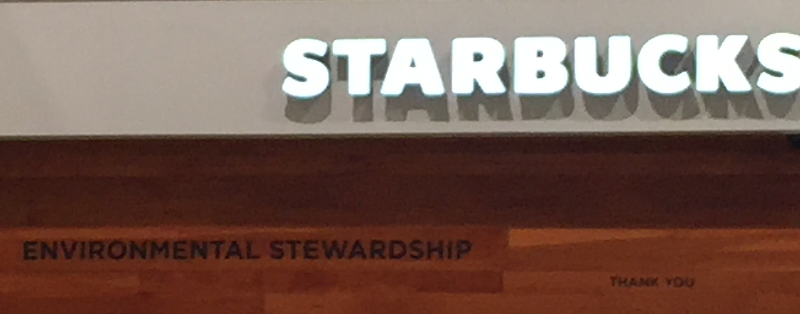Greenwashing & Other Sins
- Kara Holm
- Nov 1, 2015
- 5 min read
Let’s park my love/hate relationship with Canada’s national broadcaster for today. We can also ignore my distaste for the “gotcha” approach employed by many journalists to shame businesses, thought leaders and politicians with minimal evidence and pre-formed opinions. (I know we need watch dogs I just wish there were more of a show of impartiality.)
Today I want to return to the conversation about why “social licence” matters and how it is shaped by employing some examples I came across in my travels this past week. Social licence, can be described as the “permission to operate” that businesses receive from the public.
Thursday night, I was watching CBC Newsworld. A promotional piece for "Marketplace" caught my attention. The episode of "Marketplace" exposes two of Canada’s biggest coffee chains – Tim Horton’s and Starbucks – for allegedly misleading Canadians about their recycling programs for the ubiquitous paper cups that cannot be recycled in a traditional “blue bin” or compost because of the plastic liners.
Most Canadians care about the environment and are concerned about the waste our coffee habit generates. Many of us bring our own travel mugs – sometimes encouraged by the retailers who offer discounts or credits when you bring your own cup (David’s Tea and Stevo-Renos in Halifax come to mind). Some shops encourage ceramic mugs when you are having your drink in the café. Despite these efforts on the part of customers and businesses, there is still a huge amount of waste generated by our national caffeine habit.

Big companies like Starbucks and Tim’s recognized this concern and, to maintain their social licence, have made commitments to sustainability. One example of this is the special recycling bins for cups installed in many of their locations. The presence of these bins came with a promise that they would look after recycling the cups, ensuring the plastic was removed. These two companies are among many firms that make big commitments about sustainability. (I noticed that the Starbucks in the Halifax Airport has a sign under the logo that says “Environmental Stewardship” showing that this is a brand value that they want customers to identify with.)
"Marketplace", wanting to test the authenticity of their resolve, put cups with trackers in these special cup recycling bins in several locations around Toronto. The same evening the trackers were activated and the investigators initiated their search to determine the destiny of the cups. The investigative team located some of their cups in the garbage destined for landfills at both Tim Horton’s and Starbucks; none destined for recycling. (It is worth noting that the team was unable to locate every cup it had planted so some may have been recycled.) After the discovery, the CBC team attempted to contact both companies for “on-camera” interviews, by showing up at their corporate offices. Neither was willing to offer an interview.
Whether these cups were thrown in the trash because the companies never had any intention of recycling them, and were instead engaged with “green-washing” the public, or if they were thrown in the garbage by employees does not matter: the damage has been done. Their green credibility has taken a hit with the public. The impacts of this exposé on their business is not known yet. It is hard to assess which stories are going to have “legs” in the public sphere, beyond the immediately engaged stakeholders. For most people, caring or sustaining outrage is just too much effort. Regardless, this incident will remain an irritant for some people and make them question their choice of coffee shops. Subtly, this experience will have changed the public perception of Starbucks and Tim Horton’s.
This exposure of the coffee giants' failure to fulfill their sustainability promises is similar to the issue with Volkswagen “fooling” the emissions tests. While the VW story has largely gone away, the idea that VW is not ethical lingers, indeed there is a cloud over the entire automotive industry. Similarly, the public maintains a negative impression of British Petroleum because of the spill in the Gulf of Mexico, even though the immediate pain is not top-of-mind for most.
Businesses must understand how important it is to deliver on the promises they make to the public. They are being watched and judged. The November 2015 issue of En Route magazine features a letter by Air Canada CEO Calin Rovinescu indicating how seriously they take the question of corporate social responsibility. Mr. Rovinescu claims that Air Canada is leading not following government. He writes, “sustainability is not a destination but a behaviour.” The airlines are working hard to overcome the negative environmental reputation the industry has earned. The kind of commitment Air Canada is making has to stand up to scrutiny in order to be credible and earn social licence.
It is hard to rebuild a reputation once it has been damaged for an individual firm or an entire sector. Consider the gambling industry. In Canada, and many jurisdictions around the world, it suffers from a negative public perception. I was reminded of how this negative view of the sector has been reinforced and perpetrated by the media this week. This past Wednesday on Halifax’s “CBC Information Morning”, a public health expert, speaking about social determinants of health, made some comments about gambling. His comments perfectly illustrate why the public is so nervous about accepting gambling as a legitimate form of recreation for adults. The expert said:
…for 10%, 15% [of the population], sometimes more, they’re ruining their families’ lives. They can’t control themselves.
The vague, escalating manner in which the percentages were offered suggest that speaker was unsure of the facts. Upon reflection it would appear that the speaker was offering his opinion or belief and not any tangible information supported by research. In fact, the research suggests the incidence of moderate to severe problem gambling is an issue for 3.2% of the population, which is significantly less than the lower end of the range asserted by their expert. In Nova Scotia, the estimated incidence of problem gambling is just 1%. This expert, by making un-factual statements (in the sense that they seem to be unsupported by any actual research) on a radio program that has earned by public trust (it is the number one morning show in Nova Scotia), just reinforced what the public believes about gambling. I have written to CBC: once after the piece aired on Wednesday morning and again on Friday. They are willing note the issue on Monday (nearly a week after the original broadcast). Unfortunately, the damage is done. Once the genie is out of the bottle it is hard to put it back in. Another expert can relay the facts but the negative impression is very challenging to undo.
As consumers, we have to be discerning about the information we receive. It is easy to be influenced or assume everything we hear, see or read in the media is true. There is a noticeable bias or agenda, or ignorance or apathy, at work in every news source. We need to be aware of this shaping of the “facts” and need to take responsibility for forming our own opinions. We should have high expectations of the businesses that fight for a share of our wallet, but we must also understand the facts before forming an opinion. Social licence is within our purview to grant: it is also in our power to revoke. But we have a responsibility to base our decisions on good information and facts before rushing to judgment with the angry mob.






Comentários